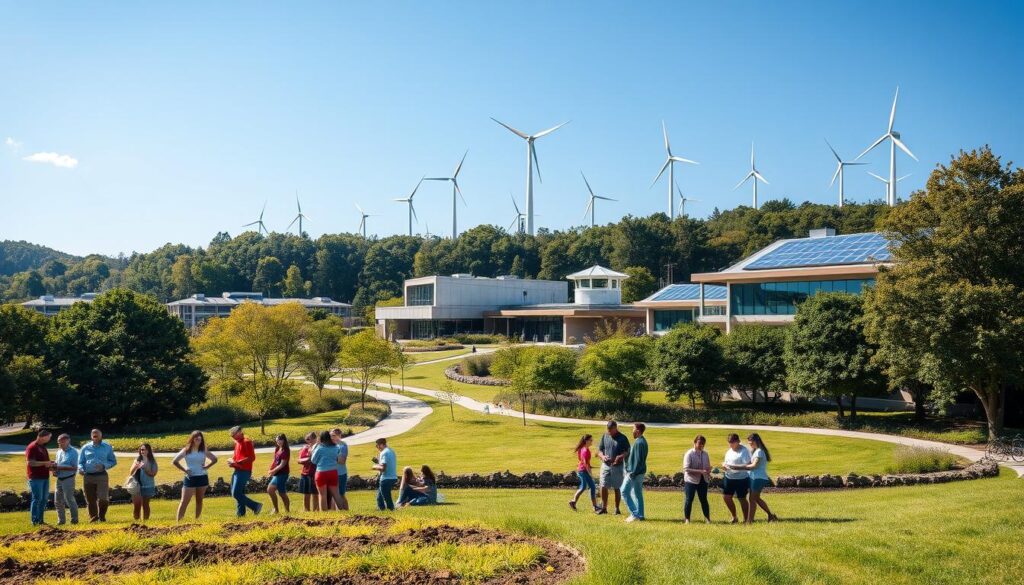Are you passionate about saving the planet and looking for a lucrative career? High-paying environmental careers are on the rise, with sustainability being the key driver. As the world shifts towards eco-friendly practices, the demand for skilled professionals in this field is skyrocketing.
Careers in this field not only offer six-figure salaries but also the satisfaction of contributing to a sustainable future. With various roles available, individuals can choose a path that aligns with their skills and interests. Whether it’s developing green technologies or implementing eco-friendly policies, these careers make a tangible impact.
Key Takeaways
- High demand for sustainability professionals
- Six-figure salaries in environmental careers
- Variety of roles available
- Opportunities for growth and development
- Contribution to a sustainable future
The Rising Demand for Environmental Engineers
The growing awareness of environmental issues has led to an increased demand for professionals who can drive sustainability initiatives. As a result, environmental engineer jobs are becoming more prominent across various industries.
Current Environmental Challenges Driving Job Growth
The world is facing numerous environmental challenges, from climate change to pollution, which are driving the demand for environmental engineers. These professionals play a crucial role in developing sustainable solutions to mitigate the impact of human activities on the environment.
Climate Change Initiatives Creating New Positions
Climate change initiatives are creating new job opportunities for environmental engineers. For instance, companies are looking for experts to lead energy efficiency projects, such as the Lead Energy Technician role at HomeWorks Energy, Inc., which highlights the importance of sustainability in the industry. Check out more about in-demand green jobs in California.
Regulatory Compliance Expanding Opportunities
Regulatory compliance is another factor driving the demand for environmental engineers. Companies must comply with environmental regulations, and these professionals help ensure that organizations meet the necessary standards, thereby expanding job opportunities.
Why Companies Are Investing in Sustainability Expertise
Companies are investing heavily in sustainability expertise to meet the growing demand for environmentally responsible practices. This investment is driven by various factors, including the need to comply with regulations and reduce costs through environmental optimization.
ESG Requirements and Corporate Responsibility
Environmental, Social, and Governance (ESG) requirements are becoming increasingly important for companies, driving the need for sustainability experts. Environmental engineers play a key role in helping organizations meet these requirements and demonstrate their commitment to corporate responsibility. For tips on building a resume for environmental engineer positions, visit career advice.
Cost Savings Through Environmental Optimization
Environmental optimization not only helps companies reduce their environmental impact but also leads to significant cost savings. Environmental engineers identify opportunities for improvement, such as energy efficiency measures, that can have a positive impact on the bottom line.
| Industry | Job Title | Average Salary |
|---|---|---|
| Energy | Lead Energy Technician | $80,000 |
| Consulting | Environmental Consultant | $90,000 |
| Government | Environmental Engineer | $100,000 |
What Environmental Engineers Actually Do
Environmental engineers play a crucial role in designing and implementing solutions to environmental problems. Their work involves a combination of technical expertise, creativity, and collaboration to develop innovative solutions that minimize environmental impact.
Core Responsibilities and Daily Tasks
Environmental engineers have a diverse range of responsibilities, from designing environmental protection systems to conducting environmental assessments and audits. Their daily tasks may involve:
Designing Environmental Protection Systems
Environmental engineers design systems to prevent and mitigate environmental pollution, including air and water pollution control systems, waste management systems, and contaminated site remediation systems. For instance, they might design a wastewater treatment system for a manufacturing plant, ensuring compliance with environmental regulations.
Conducting Environmental Assessments and Audits
Environmental engineers conduct assessments and audits to identify potential environmental risks and opportunities for improvement. This may involve reviewing environmental monitoring data, conducting site inspections, and developing recommendations for environmental improvement. As “The role of environmental engineers is not just to mitigate harm, but to create sustainable solutions that benefit both people and the planet.”
Industries That Employ Environmental Engineers
Environmental engineers are in demand across various industries, from public sector agencies to private companies. Some of the key industries that employ environmental engineers include:
Public Sector Opportunities
Government agencies at the local, state, and federal levels employ environmental engineers to develop and implement environmental policies, manage environmental programs, and oversee environmental projects. For example, the U.S. Environmental Protection Agency (EPA) employs environmental engineers to develop and enforce environmental regulations.
Private Sector Growth Areas
Private companies in industries such as energy, construction, and manufacturing employ environmental engineers to develop and implement sustainable practices, manage environmental risks, and ensure compliance with environmental regulations. According to a recent report, companies that prioritize sustainability tend to outperform their competitors financially.
| Industry | Job Title | Average Salary |
|---|---|---|
| Government | Environmental Engineer | $85,000 |
| Energy | Sustainability Manager | $110,000 |
| Construction | Environmental Compliance Specialist | $75,000 |

As “the world continues to grapple with environmental challenges, the demand for skilled environmental engineers will only continue to grow.”
Top-Paying Environmental Engineer Jobs in 2023
In 2023, environmental engineers can look forward to a range of high-paying job opportunities that combine financial reward with environmental stewardship. As companies and governments increasingly prioritize sustainability, the demand for skilled environmental engineers has never been higher.
Environmental Engineering Manager ($120K-150K)
An Environmental Engineering Manager oversees environmental engineering projects, ensuring compliance with regulations and implementing sustainable practices. With a salary range of $120K to $150K, this role is both challenging and rewarding. Key responsibilities include project management, team leadership, and strategic planning.
Senior Environmental Compliance Specialist ($100K-130K)
A Senior Environmental Compliance Specialist is crucial for ensuring that organizations adhere to environmental laws and regulations. With a salary between $100K and $130K, this role requires a deep understanding of environmental policies and excellent analytical skills. Responsibilities include conducting audits, developing compliance strategies, and collaborating with regulatory bodies.
Remediation Engineering Director ($130K-180K)
The Remediation Engineering Director leads remediation projects, focusing on cleaning up contaminated sites. This role commands a salary between $130K and $180K, reflecting its seniority and complexity. Key duties include project leadership, strategic planning, and stakeholder management.
Sustainability Program Director ($110K-160K)
A Sustainability Program Director is responsible for developing and implementing sustainability initiatives within an organization. With a salary range of $110K to $160K, this role is pivotal in driving environmental sustainability. Responsibilities include program development, stakeholder engagement, and impact assessment.
These top-paying environmental engineer jobs not only offer lucrative salaries but also provide the opportunity to make a significant impact on environmental sustainability. As the world continues to grapple with environmental challenges, the demand for skilled environmental engineers is expected to grow, making these careers both rewarding and secure.
Educational Pathways to Environmental Engineering
Educational pathways play a crucial role in shaping the careers of environmental engineers. Aspiring environmental engineers must navigate through various educational requirements to succeed in this field.
Bachelor’s Degree Requirements and Top Programs
A bachelor’s degree in environmental engineering or a related field is typically the first step. Essential coursework includes subjects like environmental engineering principles, chemistry, and mathematics.
Essential Coursework for Environmental Engineering
Key subjects include:
- Environmental engineering principles
- Chemistry
- Mathematics
- Biology
- Physics
Highest-Ranked Environmental Engineering Programs
Some of the top-ranked programs are offered by:
- Stanford University
- Massachusetts Institute of Technology (MIT)
- University of California, Berkeley

Master’s and PhD Advantages for Higher Salaries
Pursuing a master’s or PhD in environmental engineering can significantly boost career prospects and salary potential. Advanced degrees open up opportunities for senior roles and specialized positions.
| Degree Level | Median Salary Range | Career Opportunities |
|---|---|---|
| Bachelor’s | $60,000 – $80,000 | Entry-level positions |
| Master’s | $80,000 – $110,000 | Senior roles, project management |
| PhD | $110,000 – $140,000+ | Leadership positions, research |
Certifications That Boost Your Market Value
Certifications like the Professional Engineer (PE) license and specialized environmental certifications can enhance job prospects and salary potential.
Professional Engineer (PE) Certification
The PE license is a critical credential that demonstrates expertise and commitment to the profession.
Specialized Environmental Certifications
Certifications in areas like hazardous waste management or environmental auditing can further enhance a professional’s credentials.
Essential Skills for Six-Figure Environmental Engineer Jobs
The key to unlocking six-figure environmental engineer positions lies in acquiring the right combination of technical and soft skills. As the demand for sustainability experts grows, so does the need for professionals who can effectively merge technical knowledge with interpersonal abilities.
Technical Skills That Command Higher Salaries
Technical skills are the foundation upon which successful environmental engineering careers are built. Two critical areas of expertise that command higher salaries are:
Environmental Modeling and Software Proficiency
Proficiency in environmental modeling software is crucial for simulating and predicting the behavior of environmental systems. Tools like MODFLOW for groundwater modeling or AERMOD for air quality modeling are highly valued in the industry.
Data Analysis and Interpretation Expertise
The ability to analyze and interpret complex data sets is essential for environmental engineers. Skills in data analytics tools and programming languages like Python or R can significantly enhance a professional’s marketability.
Soft Skills That Set Top Candidates Apart
While technical skills are crucial, soft skills play a significant role in distinguishing top candidates in the environmental engineering field. Key soft skills include:
Project Management and Leadership Abilities
Effective project management and leadership skills are vital for overseeing complex environmental projects. Professionals who can lead teams and manage projects efficiently are in high demand.
Communication and Stakeholder Management
The ability to communicate complex environmental concepts to stakeholders, including non-technical audiences, is a highly valued skill. Strong communication and stakeholder management capabilities can make a significant difference in securing six-figure jobs.
By focusing on both technical and soft skills, environmental engineers can position themselves for success in high-paying roles.
How to Land Your Dream Environmental Engineer Jobs
Aspiring environmental engineers must navigate the job market effectively to land their ideal position. This involves a combination of strategic resume building, showcasing a strong portfolio, leveraging professional networks, and acing the interview process.
Building a Specialized Resume That Gets Noticed
A well-crafted resume is crucial for making a strong first impression. Environmental engineers should highlight their technical skills, experience with environmental regulations, and any notable projects they’ve worked on.
Highlighting Quantifiable Environmental Impacts
To stand out, resumes should include specific examples of environmental impacts, such as “Reduced carbon emissions by 25% through implementing sustainable practices.”
Tailoring Your Resume to Specific Sustainability Roles
Customize your resume for each job application, emphasizing the skills and experiences that align with the job description.
Portfolio Development: Showcasing Your Environmental Impact
A strong portfolio demonstrates an engineer’s capabilities and commitment to environmental sustainability. Include detailed case studies and project outcomes.
Networking Strategies in the Sustainability Sector
Networking is vital for accessing job opportunities and staying updated on industry trends. Environmental engineers can benefit from joining professional organizations and leveraging LinkedIn.
Professional Organizations Worth Joining
Organizations like the Environmental and Water Resources Institute (EWRI) and the Air and Waste Management Association (AWMA) offer valuable networking opportunities.
Leveraging LinkedIn for Environmental Engineering Connections
Utilize LinkedIn to connect with industry professionals, join relevant groups, and stay informed about job openings and industry news.
Acing the Environmental Engineering Interview
Preparation is key to acing an interview. Review common interview questions, practice responses, and be ready to discuss your experience and skills in detail.
By focusing on these strategies, environmental engineers can significantly improve their chances of landing their dream job.
Career Advancement: From Entry-Level to $100K+ Positions
Career advancement in environmental engineering is driven by a combination of technical expertise, soft skills, and strategic career moves. As the demand for sustainability experts grows, environmental engineers have numerous opportunities to climb the career ladder and secure $100K+ positions.
Typical Career Progression Timeline
Understanding the typical career progression timeline is crucial for environmental engineers aiming for higher salaries. The journey typically unfolds in stages.
First Five Years: Building Technical Expertise
During the initial five years, environmental engineers focus on developing a strong foundation in technical skills. This includes gaining proficiency in tools like GIS, water quality modeling, and environmental impact assessment.
Years 5-10: Transitioning to Management Roles
As they progress, engineers typically transition into management roles, overseeing projects, leading teams, and making strategic decisions that impact organizational sustainability goals.
Specializations That Command Premium Salaries
Certain specializations can significantly boost earning potential. These include:
- Remediation engineering
- Sustainability consulting
- Climate change mitigation
- Environmental policy development
Engineers who develop expertise in these areas can command premium salaries.
| Specialization | Average Salary Range |
|---|---|
| Remediation Engineering | $110K – $140K |
| Sustainability Consulting | $100K – $130K |
| Climate Change Mitigation | $120K – $160K |
When to Make Strategic Career Moves
Timing is everything in career advancement. Recognizing growth opportunities and negotiating higher compensation are key.
Recognizing Growth Opportunities
Environmental engineers should stay alert to emerging trends and technologies, positioning themselves for roles that are in high demand.
Negotiating Higher Compensation
When transitioning to new roles or taking on additional responsibilities, engineers should be prepared to negotiate salaries based on their value to the organization.
“The future belongs to those who believe in the beauty of their dreams.” – Eleanor Roosevelt. This quote resonates with environmental engineers who are driven by a passion for sustainability and a desire to make a positive impact.
Real-World Impact: How Environmental Engineers Are Saving the Planet
Through their work, environmental engineers are creating a more sustainable future for generations to come. They are at the forefront of developing and implementing innovative solutions to pressing environmental challenges.

Case Studies of Transformative Environmental Projects
Environmental engineers have been instrumental in various high-impact projects. These include initiatives in water conservation and renewable energy integration.
Water Conservation Innovations
Engineers have developed advanced water management systems, significantly reducing waste and improving efficiency. For example, smart irrigation systems that use real-time weather data to optimize water usage.
Renewable Energy Integration Success Stories
Successful integration of renewable energy sources into the grid has been a significant achievement. Projects include large-scale solar farms and wind energy installations that have reduced reliance on fossil fuels.
Measuring Your Sustainability Impact
To understand the effectiveness of their work, environmental engineers must measure their sustainability impact. This involves quantifying environmental benefits and communicating value to employers and clients.
Quantifying Environmental Benefits
Engineers use various metrics to quantify the environmental benefits of their projects. These include carbon footprint reduction, water savings, and biodiversity improvements.
Communicating Value to Employers and Clients
Effectively communicating the value of sustainability projects is crucial. Engineers must present their findings in a clear and compelling manner, highlighting the economic and environmental advantages.
By focusing on real-world impact and measurable outcomes, environmental engineers continue to drive progress in sustainability. Their work not only benefits the environment but also contributes to the growth and success of organizations.
Conclusion: Your Path to a Rewarding Environmental Engineering Career
Pursuing a career in Environmental Engineering can be a highly rewarding decision, offering numerous opportunities for personal and professional growth. As highlighted in the article, various roles in this field come with high salary potential, ranging from $60,000 to over $180,000 per year, depending on experience and specialization.
With the rising demand for sustainability experts, individuals can explore diverse career paths, including solar engineering, wind turbine technology, and energy storage specialization. Acquiring relevant technical skills, such as installation and maintenance, and transferable skills like project management and sales, can significantly enhance employability.
Certifications like NABCEP can further boost career prospects. Exploring training and upskilling opportunities, such as fast-track training programs, online courses, and apprenticeships, can also be beneficial. For more information on clean energy jobs and career opportunities, visit USA Club Jobs.
By combining the right education, skills, and certifications, individuals can embark on a fulfilling Environmental Engineering career, contributing to a sustainable future while achieving professional success.